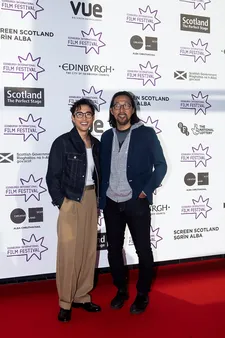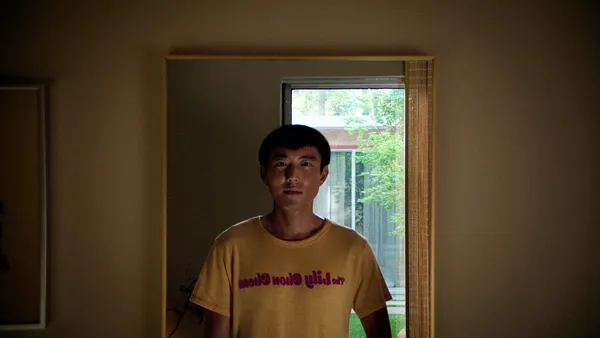After Yang considers both the construction of family and identity as passed through the prism of a growing sense of grief. The latest film from Kogonada, which closed Edinburgh Film Festival and will be in cinemas and on Sky Cinema from Friday September 22, stars Justin H Min as Yang, an AI helper, bought by Jake (Colin Farrell) and his wife Kyra (Jodie Turner-Smith) to be a big brother and helpmate for their adopted daughter Mika (Malea Emma Tjandrawidjaja). When Yang malfunctions near the start of the film, it is initially an annoyance for Jake but as he learns more about Yang's secrets he experiences an increasing sense of loss.
Shortly before the film screened at EIFF I caught up with Kogonada and Min to chat about the film. After writing his previous film, Columbus, from scratch, Kogonada explained the difference between that and adapting After Yang from the short story by Alexander Weinstein.
“It was nice, in some ways to have a structure already,” he says. “It really was about expanding, and being able to work with characters already in place in an arc that already exists. Whereas when you're starting from scratch you're building those from ground up. And maybe sometimes it can feel like a constraint or an obstacle to some creative freedom or exploration that you want. But I found it really liberating in its own way. Different but because it had the seeds and the DNA of all the things I wanted to explore, it really was a great sort of starting point. I just finished adapting a larger work (Pachinko), where you have to really condense things or work differently. But with a short work, it really is about expanding and so much of it just felt like writing an original script outside of having a preliminary arc to work with.
“If someone likes a short, they know that that has to be done. And I think with maybe novels that people love, you feel burdened by kind of, you know, carrying over whatever attachments people have to that. So, I found it really freeing.”
There's a strong air of mystery about Yang as facets of his life are revealed after he has "died" and Min says that was a feeling Kogonada helped foster.
 |
| Justin H Min and Kogonada at EIFF's Closing Gala screening of After Yang Photo: Pako Mera |
“Even while filming, I don't think I ever really came to a sure answer myself and that is, hopefully what you saw when you refer to ‘mystery’, and even various takes of Yang, you know, I think we would calibrate it sometimes to feel a little more human or a little more artificial. And then sort of cutting and pasting and editing those parts sort of added to the mystery of all of that. I think as an actor, the thing that I wanted to be most specific about in my approach and my preparation was his relationship to each of the characters, which I felt was very distinct and unique.
“In many ways, Yang serves as a confidant, because they can say things to Yang that they can't say to each other, they connect in a way with Yang that they cannot connect with each other. And so I wanted to make sure that the secrets and the relationships that Yang had with each of the characters was embodied and though you might not ever see those scenes, and though those scenes don't play out of the movie that you can get sort of whispers and echoes of that in the flashback scenes that you see with each of them.”
One of the key themes of the film is grief and thinking about grief. There's a tendency for people who haven't experienced significant loss to think about grief as something looking backwards, to a specific memory, but I ask Kogonada what he thinks about the idea of “future grief”, when you experience something new that you can't share with the person that you've lost or you encounter something about that person, an artefact or something, and you can't discuss that thing with them, as that is something Jake experiences in the film.
He says the idea of “future grief” is “striking” and adds: “It was an exploration of grief in that in that non-typical way, because I think, you know, if it was the death of a son, and in some ways, he's this sort of artificial surrogate son, we would understand that grief that a father or mother would have. But what was so interesting is that Mika immediately feels loss but for the parents, it's inconvenient. They're treating him as like an appliance, and certainly for Jake, it feels frustrating, and it's going to be more inconvenient not to have this babysitter around. And that's really like what he's trying to wrestle with.
“But I love this idea of catching up to grief, you know, that it wasn't this immediate grief that a parent would feel, but it was like it that in order to grieve, you have to love first. The cost of loving is loss. And I love that what we're seeing is someone who is catching up to a grief that he didn't fully have. It's only in the end that he's really broken by the loss of Yang. To play off your idea that grief is ahead of him, it is in the future.I also love the idea that it is this like an ability, like once he's caught up to it. And it's suddenly like, 'Oh, he was a son that I never had'. But he didn't know it in the moment and now he can't really explain it. You know, it's that thing that you're talking about, when you now want to say something, or discuss it with Yang and at that point, it's too late, he's just a memory.”
This adds another layer of unknowability to Yang, who in some ways seems to be a mystery even to himself. Yang realises he has been constructed to look Asian and to have a certain cultural history, which allows Kogonada to explore ideas of cultural tension, in that even humans are all manufactured in some ways by society.
Kogonada suggests Min should talk about the subject adding: “That construct of Asianness is something I think we both have experienced in our lives. Neither of us are robots, but there is something that is very relatable to Yang because he's really a manufactured idea of Asianness, but you should speak to it as someone to it.”
Min adds: “What Yang sort of experiences is what I've experienced very personally. I mean, I grew up in the States. I was born and raised in California, but obviously, I look very Asian. And what does that mean for me and my identity, and when my parents tell me of stories and traditions from their mother country of Korea, I know those things on a very cognitive level but those things aren't substantially weighted to anything real because those are not my memories, they're echoes of their memories.
“This movie is such an interesting exploration of that through Yang's eyes, and even the way in which Yang educates others on his Asianness is something that I've continued to experience in America because that's something that people expect me to know because I look Asian, and so they want to talk to me about Kpop and Korean food. Some things I do know about and a lot of things I don't. But it is interesting that the onus is on me because I look a certain way to educate them on quote unquote, Asian identity.
That idea suggests a quasi-nostalgia for a thing that you haven't had, in a sense, the way you might feel nostalgia for something that your parents had.
“I think that's really right on,” says Kogonada “I think living in a modern world, we all feel it, you know, this sort of alienation from our roots, and we're all sort of fragmented, and life is moving so fast. But I think deep inside of all of us, we want to feel that kind of connection and lineage and something that makes it feel that we are not just floating in this world, but that we have a real connection that we're tethered, in a way. But I don't think it's available to a lot of us, because we all have been uprooted. So, yeah, I think that kind of almost manufactured nostalgia fulfils some of that longing that we have.”
In terms of the look of Kogonada’s films, there’s always a feeling of balance and a tranquility to the rhythm and I ask him how he achieves that.
“I think part of it is bringing people who are kind of attuned to that,” says the director “I don't think I've ever had to say to any of my actors to be in this sort of rhythm, they've kind of walked into it. And the best actors are very attuned. They do their own homework when they come into a project. And I think, because now I have more work out there, a lot of them kind of come in knowing a sort of the rhythm of it. I feel really fortunate because it has felt organic in the filmmaking process, that that sort of tempo exists. And it really is just something that I love myself.”
The sense of architecture, noticeable in buildings in Kogonada’s previous film Columbus, is here on a smaller scale.
He adds: “It's just important to me. I think it's very hard for me to know how I'm going to shoot a scene without really having a sense of space and place. The real gift of cinema, to me, is when a film gets underneath my skin and becomes a part of my memories, and all the films that have stayed with me have a deep sense of place. And, for me, having an opportunity to make a film, I just connect to space and the architecture.
“The great thing about architecture is the medium is really emptiness, you know, you create absence in building a wall. You didn't really never have a frame for absence and once you start building walls, you make emptiness apparent, and that's, that's a big part of the kind of cinema that I love. So the shape of emptiness. I've never said this, but the shape of emptiness means something to me. And so that's part of the process with the production designers.”
After Yang will be released in cinemas and on Sky Cinema from 22 September























